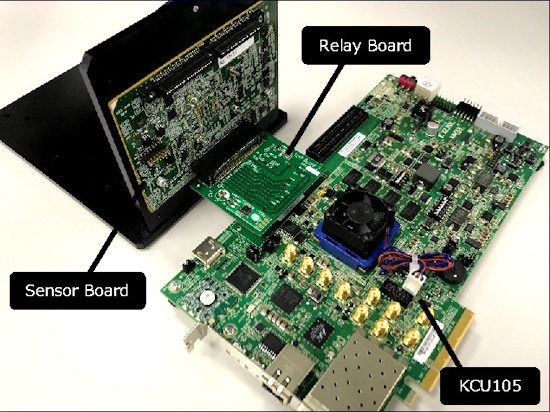SLVS-EC Receiver IP
SLVS-EC Receiver IP
SLVS-EC Overview
SLVS-EC (Scalable Low Voltage Signaling with Embedded Clock) is a high speed, high performance interface for Sony CMOS image sensors.
SLVS-EC differs from conventional LVDS interface in that the clock is embedded in the data, allowing circuit design without considering the pesky skew between serial buses. In a nutshell, SLVS-EC enables faster, lower power design made easy.
SLVS-EC Receiver IP Overview
CIS has concentrated on extracting pixel data from the byte data received via FPGA’s high speed transceiver, enabling an IP with low FPGA resource usage. Additionally, we have added support for payload error detection and error correction (optional).

SLVS-EC Receiver IP Details
Specifications
| SLVS-EC Version | SLVS-EC v2.0 compliant |
|---|---|
| Lane | 1,2,4,6,8 |
| Raw Format | 8,10,12,14,16 |
| Line Length | 4~∞(default 65532) |
| CRC | Available |
| ECC | Available(Optional) |
| Baud Rate | Grade1~3 |
| Multi Stream | N.A. |
| Output Signals | Pixel Data,Sync-Singnals,Packet Header etc. |
Resource Usage
One of the advantages of CIS's SLVS-EC Receiver IP is its low resource usage. Although this IP allows you to dynamically change the number of SLVS-EC lanes, which affects resource usage, you can further reduce resources by limiting the maximum number of lanes used or by using a fixed lane configuration. The resource usage in Artix7 (Vivado 2022.1) is as follows:
Variable lane(Parentheses indicate ECC options available)
| Resource | Max.2Lane | Max.4Lane | Max.8Lane |
| LUT | 1116(2681) | 1761(3829) | 4165(6927) |
|---|---|---|---|
| FF | 904(2351) | 1253(3081) | 1965(4523) |
| BRAM | 0(2.5) | 0(2.5) | 0(3.5) |
Fixed lane(Parentheses indicate ECC options available)
| Resource | 1Lane | 2Lane | 4Lane | 6lane | 8lane |
| LUT | 887(2181) | 971(2430) | 1323(3400) | 2723(5576) | 2290(5412) |
|---|---|---|---|---|---|
| FF | 807(2250) | 863(2308) | 1155(2985) | 1777(4329) | 1816(4369) |
| BRAM | 0(2.5) | 0(2.5) | 0(2.5) | 0(3.5) | 0(3.5) |
Supported Devices
AMD 7-series, AMD Ultrascale, AMD Ultrascale+, Efinix Titanium, Efinix Topaz
Demonstration Environment
CIS provides relay boards for connecting SONY's IMX420 sensor board and AMD's evaluation boards, as well as reference designs for each evaluation board. For example, you can demonstrate Raw8, Raw10, and Raw12 using up to 2 lanes when using AC701, and up to 8 lanes when using KCU105 and ZCU106. Customers can freely customize and use the reference design.

Support
CIS has many experienced engineers in the fields of RTL design related to various high-speed interfaces and image processing, board design including high-speed signals, and embedded software development, etc. Please feel free to contact us for IP customization, etc.
Product Information
SLVS-EC
SDI IP